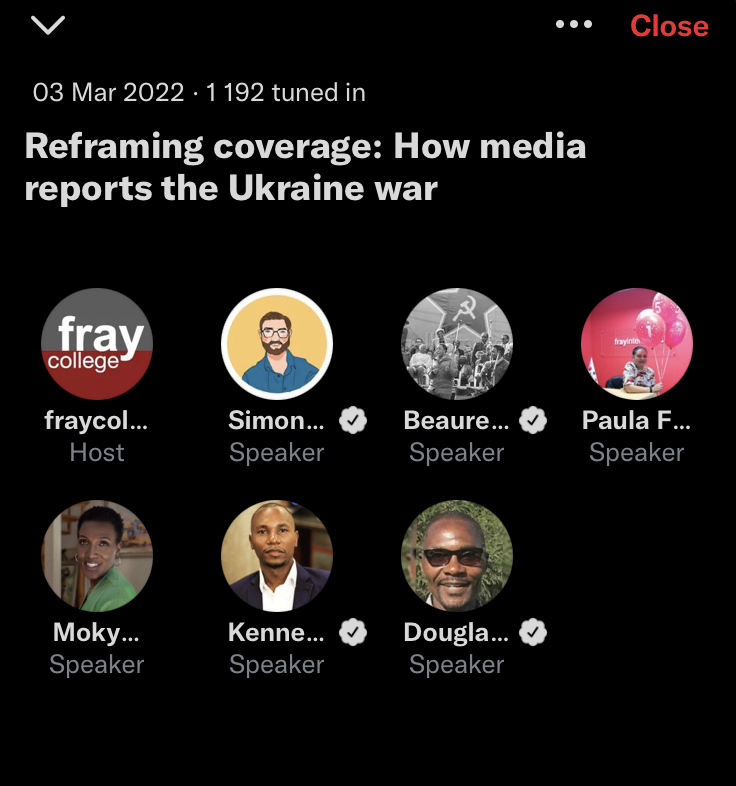
We need to cover Africa ourselves if we want to control the African narrative and how Africa is imagined.
This was the consensus in the Reframing coverage: How Media reports the Ukraine War Twitter Space conversation recently hosted by fraycollege of Communications.
“Until we do that, as long as we keep relying on other people to tell those big stories, then yes, they are going to be told terribly. They are going to tell them with their own biases and prejudices and we are going to have to suffer through that,” said The Continent editor Sam Allison.
The Twitter Space followed what has been called “biased and racist reporting” from western media organisations as they covered the Ukraine-Russia war.
When ITV News correspondent Lucy Watson on ITV reported back to the studio, she summed up the crisis by explaining that “…the unthinkable has happened…this is not a developing, third-world nation; this is Europe…”.
In a statement the Foreign Press Association Africa (FPA) expressed disappointment about the framing of the coverage of Ukraine, condemning what they said was the racist distinctions made by western media between war and suffering in Ukraine and those that have taken place in developing countries.
“The horrors inflicted on the Ukrainian people are newsworthy and must be condemned, however, the racism in media coverage of the crisis must also be challenged,” said fraycollege CEO Paula Fray.
“I think that the underlying subject is that this war is worthy of coverage and sympathy because the conflict is in the so-called civilised city. It really uncovers deep-seated socialisation that impacts for us as journalists who makes the news and how developing nations including those in Africa are reflected in the news,” Fray said.
Speaking to comments made by western journalists in their reporting of the Ukraine crisis, FPA chairman Kennedy Wandera highlighted that coverage of a war that had been devastating thousands in Ukraine had been used as a platform to perpetuate racist behaviour.
“To some extent, you realise that these are not words that come from the script of journalism. These are words that come from the long-held biases of racism that has been there and it’s not journalism.”
“Whatever you cover, just stick to the tenets of journalism without trying to depict people as brown because you are white then you must report differently,” he said.
China Global Television Network African (CGTN) African affairs editor Douglas Okwatch said the war in Ukraine is “about the balance of power where one part of the world wants to extend its influence over another”.
“I think in journalism there is a balance of power where the western media are the ones that enjoy monopoly in that arrangement. The world is seen largely through the lens of western media,” he said.
A recent report on African media by Africa No Filter unveiled how western sources dominate the African story.
The report found that one-third of all African stories in media outlets on the continent are sourced from news services outside Africa.
The report highlights that stories about Africa continue to be told through the same persistent and negative stereotypes and frames of poverty, disease, conflict, poor leadership and corruption.
“This is not something new, it’s something that happens all the time […] when they cover Africa they show dead bodies, blood and gory images because that is how they want to depict Africa,” added Okwatch.
There’s a view of Africa being a war continent and this has been perpetuated over time and this war has exposed what was already there, Africa No Filter director Moky Makura said.
“The fifth (lense) is the one the Ukraine invasion has seemed to make apparent. The world sees Africa through the lens of conflict and all the articles, art and coverage we’ve seen is that conflict lives in Africa and not where people with blue eyes and blonde hair live,” she highlighted.
Allison argued that these narratives about Africa not only persist because they are ignored but because they stem from African media’s inability to cover Africa itself.
“I think we’re going to keep having these problems until we, as African journalists, get our own act together. The coverage of international events that we receive in Africa is overwhelmingly produced by western media outlets,” said the editor.
“We need to start covering Africa properly for ourselves and we need to start covering the world.”
Makura believes that changing the narrative is critical as the negative stereotypes are also perpetuated within Africa itself.
“We know that narrative is important because it informs beliefs and beliefs inform behaviour and this is how the stories we are reading have an impact on us and how we treat each other,” Makura explained.
“Narrative is critical and we need to change it because it actually affects how people treat each other,” Makura said.

